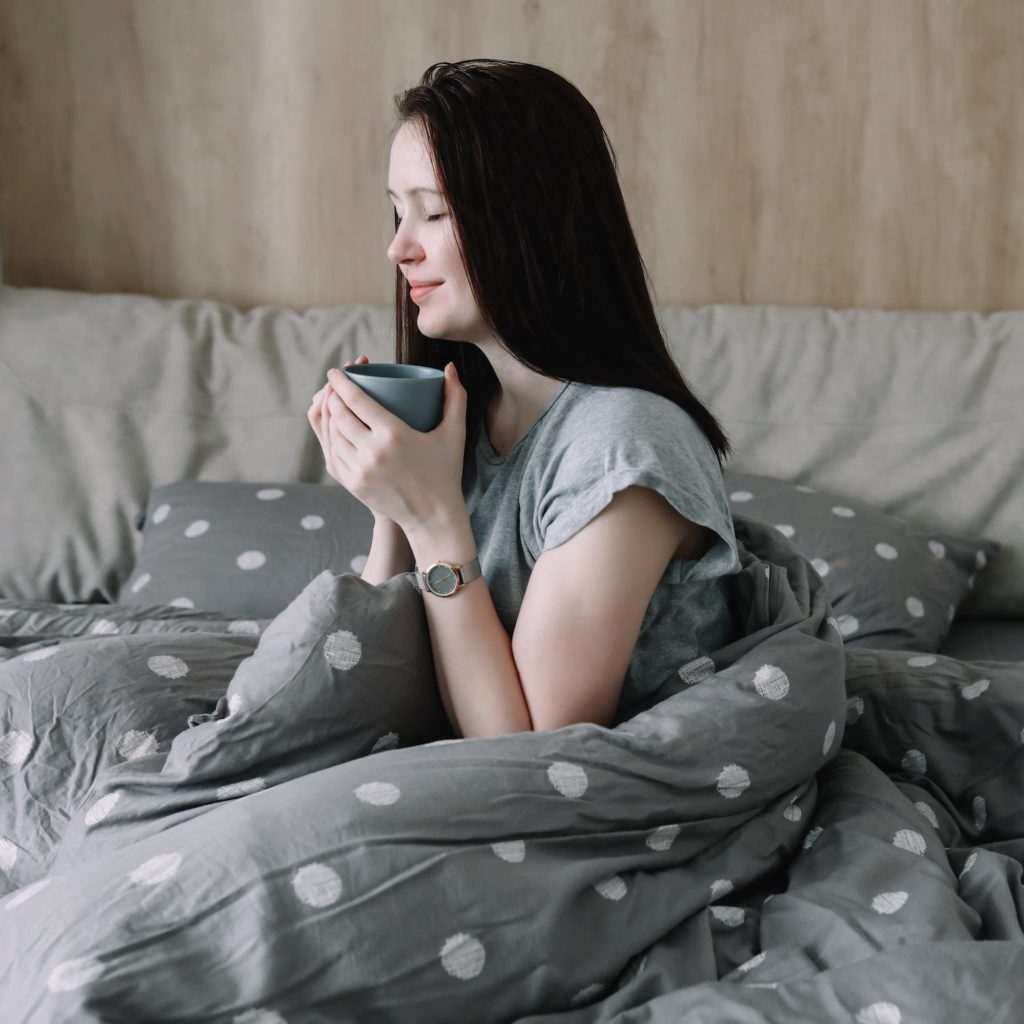Up to 90% of adults consume caffeine on a daily basis to decrease sleepiness and boost performance on mental and physical tasks. Unfortunately, these same benefits can become nuisances if caffeine is consumed too late in the day. Experts recommend avoiding caffeine for at least eight hours leading up to bedtime. Caffeine can interfere with your body’s natural sleep cues, so what time you decide to stop drinking caffeine will depend on when you want to sleep.
Quick Guide to Caffeine

- 1 Stop consuming caffeine at least 8 hours before bedtime.
- 2 Track how much caffeine you are drinking.
- 3 Slowly cut back on caffeine by switching to less caffeinated options.
Your diet plays an important role in your sleep health as well as your overall health.
How Long Before Bed Should You Stop Drinking Caffeine?
When to stop drinking caffeine depends on your desired bedtime. Since the half life of caffeine in the bloodstream is at least four hours, you can expect the effects to subside after eight or more hours. To get a good night’s rest, experts suggest that you stop drinking caffeine at least eight hours before you want to fall asleep.
People vary in their response to caffeine, so you may have different needs when it comes to how long you should abstain from caffeine before sleep. Your response to caffeine is affected by factors like your age, sex, genetics, and any medications you take.
How Does Caffeine Impact Sleep?
Consuming caffeine too late in the day, such as after lunch, can make it difficult to have a restful night of sleep.
Caffeine makes you feel as though you have more energy by blocking brain signals that promote sleep. Research suggests that caffeine also makes you feel more awake because it disrupts your body’s internal clock.
Common effects of caffeine on sleep include:
- Lengthening the time it takes to fall asleep
- Shortening the amount of time spent asleep
- Altering the time spent in deep sleep
- Contributing to reduced sleep quality
Length of Time Caffeine Stays in the Body
The stimulating effects of caffeine can last eight hours, if not longer. Every additional serving of caffeine extends this time, so the more caffeine a person drinks, the longer it will take for the effects of caffeine to wear off.
After caffeine is consumed, it is quickly absorbed in the body. The energizing effects of caffeine begin around 15 to 45 minutes after eating or drinking. After consumption, caffeine is broken down by the liver and leaves the body through the urine.
How long it takes for the body to break down caffeine varies between individuals. For example, people who are pregnant or use oral contraceptives take longer to break down caffeine, while caffeine is broken down faster in people who use nicotine products.
Some people are also more sensitive to caffeine than others. Sensitivity to caffeine is affected by a person’s age and their tolerance to caffeine’s effects. A person’s genetics is also thought to determine how sensitive they are to caffeine by impacting how well caffeine can block sleep-related brain signals.

How Much Caffeine Should You Drink?
The U.S. Food and Drug Administration (FDA) suggests that caffeine is not harmful for the average adult if they consume less than 400 milligrams per day or around 32 ounces of coffee. Caffeine can be dangerous when rapidly consumed at doses reaching 1,200 milligrams, which is equivalent to approximately 12 cups of strong coffee.
Certain groups of people might do well limiting or avoiding caffeine altogether, including people who have:
- Sleep disorders like insomnia
- Migraines
- Anxiety
- Gastrointestinal issues
- Heart arrhythmias
- High blood pressure
Other groups of people should also check with their doctor about whether it’s safe to consume caffeine and how much they can drink. This includes people taking certain medications, including antibiotics, stimulants, and medications for the heart. Children, teens, and people who are pregnant or breastfeeding should be especially cautious about caffeine consumption.
Drinks That Are High in Caffeine
Drinking caffeinated beverages is so common that people sometimes forget that caffeine is a stimulating drug. Present in everyday food and drinks, caffeine occurs naturally in some products and is added to others.
Caffeine occurs naturally in plants used to make coffee, tea, and even chocolate. It can also be made in a lab and added to medicines and products like energy drinks.
Although not required to by the FDA, many caffeinated products report the amount of caffeine they contain per serving on their packaging.
| Beverage | Serving Size | Approximate Caffeine Content |
| Tea | 8 ounces | 40-120 milligrams |
| Coffee | 8 ounces | 102-200 milligrams |
| Espresso | 1 ounce | 30-90 milligrams |
| Soda | 12 ounces | 0-71 milligrams |
| Energy drinks | Variable | 48-500 milligrams |
| Hot chocolate | 8 ounces | 3-13 milligrams |
How to Have Caffeine and Get Quality Sleep
There are a number of strategies to enjoy your favorite caffeinated beverage and still sleep well.
- Stop drinking caffeine by midday: By paying attention to when you drink caffeine you can limit its effect on your sleep. Drinking caffeine towards the beginning of the day can mean lower levels of caffeine in your body at night and fewer sleep disruptions.
- Track your caffeine intake: Keeping track of how much caffeine you are drinking can help you understand your sensitivity to caffeine and how long it stays in your system. Keep in mind that coffee, soda and tea vary in their caffeine content between brands.
- Decrease how much caffeine you drink: To avoid disrupted sleep, you may want to cut back on caffeine. It is a good idea to do this slowly, so try swapping highly caffeinated drinks for less caffeinated options. Switching from coffee to tea or having decaffeinated versions of your beverage of choice can make a big difference.
When cutting back on caffeine, people may experience symptoms of caffeine withdrawal like headaches, fatigue, and mood changes. If decreasing caffeine is difficult due to side effects or other reasons, it may help to work with your doctor.
Other Ways to Boost Your Energy
Caffeine isn’t the only way to wake up and feel alert. People often drink caffeine because of difficulty getting up, daytime sleepiness, or trouble focusing–but these are also signs of poor sleep.
Getting the right amount of restful sleep can help you feel more energetic and reduce the need for caffeine. Strategies to increase energy without caffeine include ways of improving your sleep hygiene.
- Decrease light exposure before bed: Exposure to light can increase alertness. Light in the early morning can help you wake up, while dimming lights and avoiding screens that emit blue light during the two hours before bed prepares your body for sleep.
- Exercise regularly: Exercising during the day improves sleep during the night. Regular exercise is also associated with less daytime sleepiness.
- Take a nap: Naps are a great way to boost energy during the day. However, if you find that falling asleep at night is difficult, don’t take naps later in the afternoon or evening.
- Decrease your sugar intake: Research suggests that the idea of a “sugar rush” is a common myth. Instead, people are likely to experience fatigue or a “sugar crash” around an hour after consumption. Sugar also affects the quality of nighttime sleep, so less sugar may help reduce daytime fatigue.
If your goal is to feel less sleepy and more awake during the day, focusing on steps to improve your nighttime sleep may be the best approach. While caffeine offers short-term perks, it’s no replacement for the benefits of sufficient and high-quality sleep.
References
Ask the Sleep Doctor
Have questions about sleep? Submit them here! We use your questions to help us decide topics for future articles, videos, and newsletters. We try to answer as many questions as possible. You can also send us an email. Please note, we cannot provide specific medical advice, and always recommend you contact your doctor for any medical matters.








